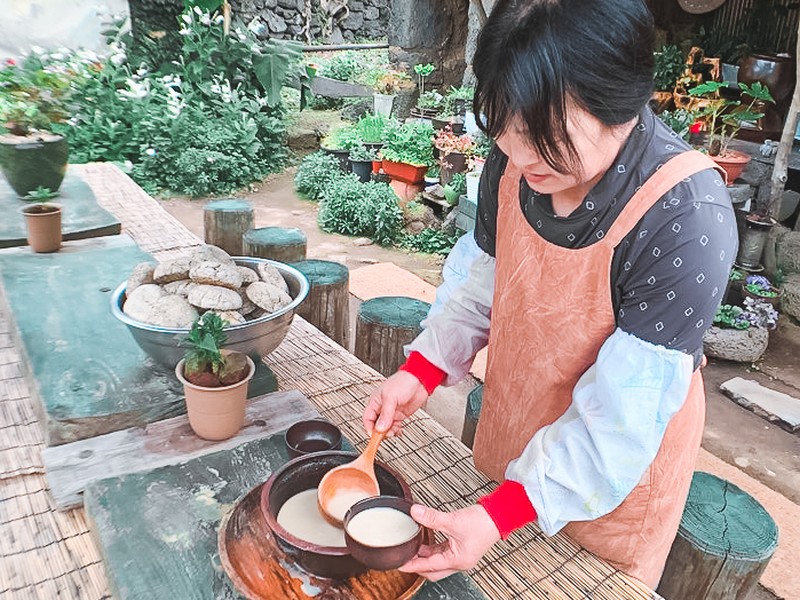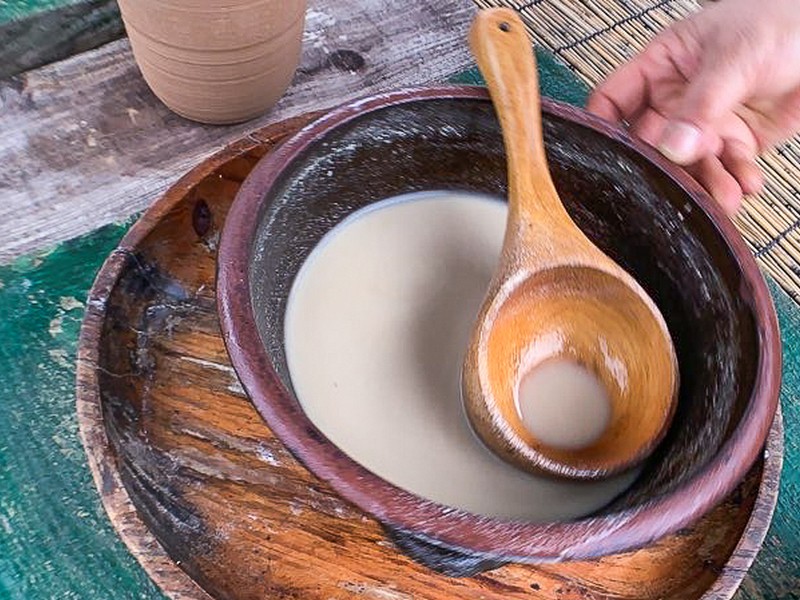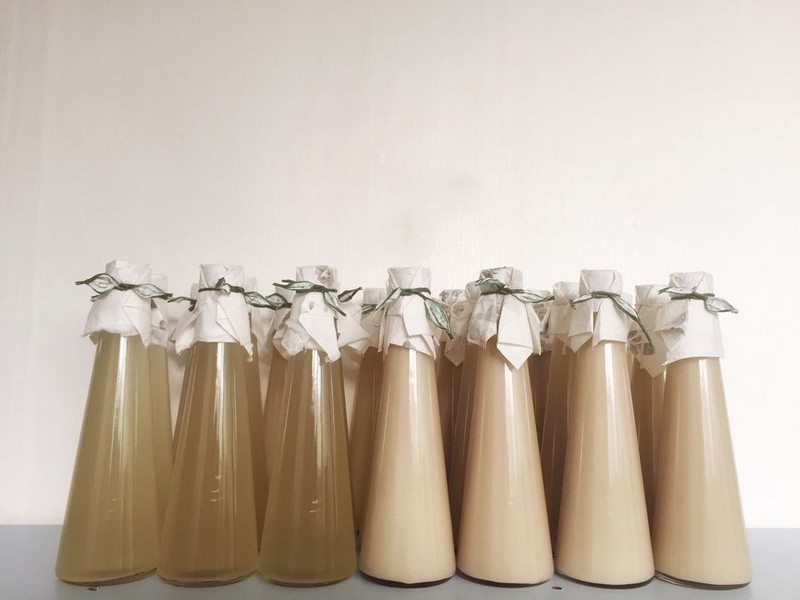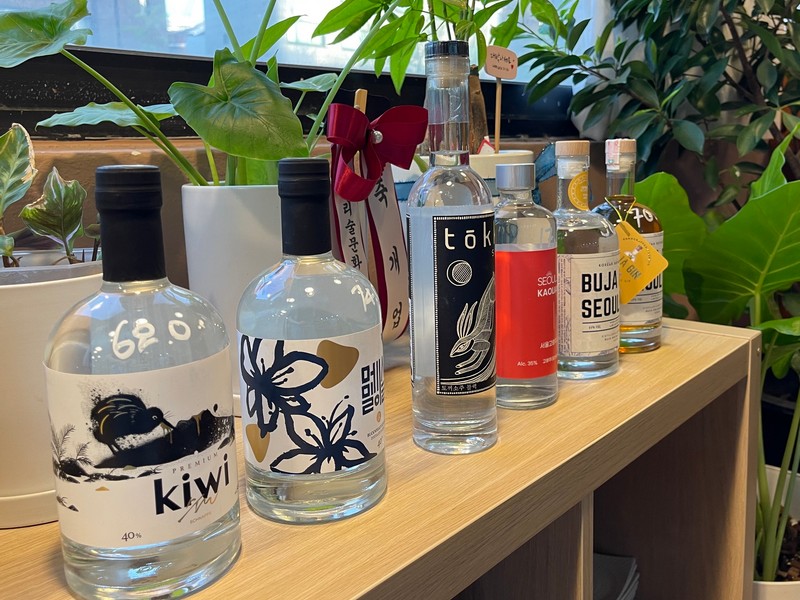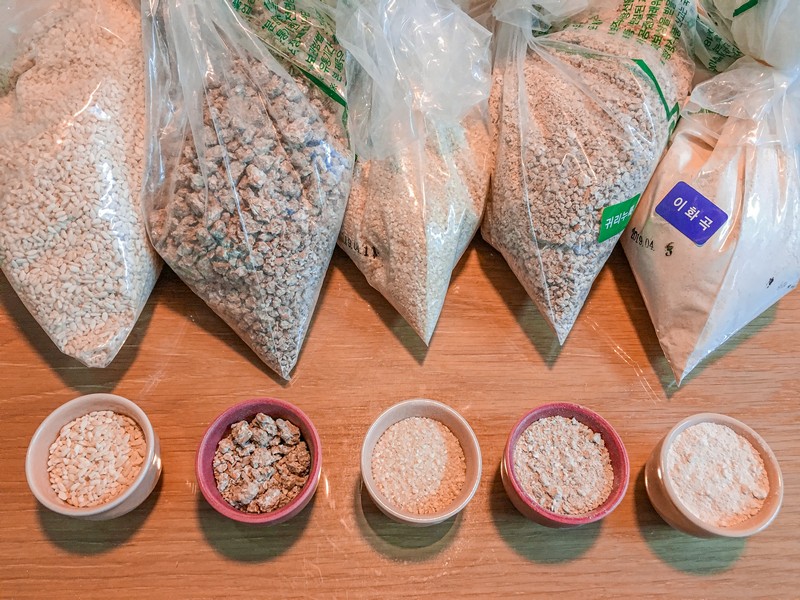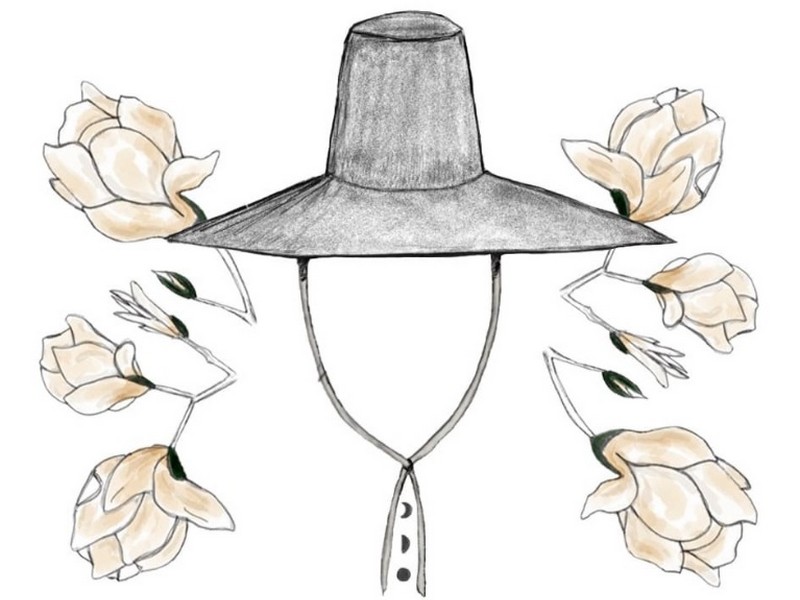KOREA | NETHERLANDS | GLOBAL
Makgeolli in Jeju: The Ultimate Guide to Korean Alcohol on Jeju Island
Planning a trip to Jeju? Get all you need to know about the local Korean alcohol scene before you go! Jeju Island has always been a popular destination to get some down-time, and now more than ever its allure is attracting visitors. There’s so much to explore, experience, and most of all eat in Jeju. But one of the most common questions I get from eager Jeju travelers, is what about the makgeolli? What are the must-try kinds of sool and what breweries are worth a visit on Jeju Island?
What to know before you go
So before we take a virtual tour of what to drink on your next Jeju vacation, there’s one super important thing to know about Jeju and makgeolli. Jeju Island happens to be volcanic terrain, and as such it’s not naturally an easy place to grow rice. For that reason, Jeju has a distinctly different sool culture compared to mainland Korea.
Instead of using rice, there is more use of millet in brewing alcohol in Jeju. The word ‘Omaegi’ is the Jeju dialect for millet, and therefore the most representative alcohol from Jeju is ‘Omaegi Sool’. There are a few producers of this kind of sool, which we will get to, but suffice to say there are not a lot of makgeolli brewers on Jeju that make straight rice brews. So let’s get to it!


Makgeolli on Jeju Island
1. Jeju Makgeolli (제주 막걸리)
Of course, probably the most commonly found makgeolli throughout the island, and even sometimes in bars in Seoul, is Jeju Makgeolli. Not exactly high on the list in terms of craft or quality, but certainly iconic when it comes to representing the local makgeolli industry. It, unfortunately, is in the aspartame category of brews, but what we do like is their commitment to giving back to the community. Jeju Makgeolli began as a co-op of 8 smaller breweries back in 1980, and they continue to donate 1% of their profits to the Red Cross and also to support other local industries. So even if the taste isn’t at the top of the charts, you can feel great about supporting local businesses.
2. Udo Peanut Makgeolli (우도땅콩 막걸리)
A visit to Jeju is not complete without taking a day trip to Udo. This tiny island is one of the great gems to visit, with beautiful scenery and pristine beaches to stroll away from your frustrations. You also can’t turn a corner without noticing something ‘peanut’ related. Udo is famous for its quality peanuts, so you can find anything from peanut cosmetics to the Do-Not-Miss peanut ice-cream. So it stands to reason that there is a Peanut Makgeolli, and just like the ice-cream, people seek it out to satiate their curiosity.
But here’s the kicker… what you’re drinking may not be brewed on Udo! There are actually two types of Peanut Makgeolli – one that is brewed by the Joeun Sool Sejong Brewery in Cheongju, using peanuts grown on Udo, and the other is brewed locally on Udo by Nakwhagokju. So how do you know if you’re drinking the real deal? Check the labels and also the percentage of peanuts.
The mainland produced version contains 0.44% of peanuts while the Udo produced products contains 1.79% peanuts. You will often see the lower peanut quantity makgeolli for sale at the duty-free shops, whereas the local Udo makgeolli is more commonly found in restaurants. Both products contain aspartame and are pasteurized.
If you find yourself on Udo, get yourself straight to the source! The brewery has a cafe where you can have lunch and taste their two kinds of makgeolli, as well as some of the aforementioned coveted peanut ice cream.
Nakwhagokju (우도땅콩막걸리낙화곡주)
- Address: 10 Udo Biyang-gil, Udo-myeon, Jeju-si (제주 제주시 우도면 우도비양길 10)
3. Hallabong Makgeolli (한라봉 막걸리)
So you’ve had the Jeju Makgeolli, done your due diligence in trying Udo Peanut Makgeolli, but in order to complete the trifecta then Hallabong Makgeolli is next.
Once again, Jeju is famous for Hallabong or Jeju Island citrus, so-called because it looks like the shape of the peak at Halla Mountain. Local ingredients often get incorporated into makgeolli all over Korea, partly because there is an agricultural incentive to do so, and also because it’s great marketing. However in this case, there is more than one brewery making Hallabong makgeolli and none of them are actually brewed on Jeju island itself.
You will find Hallabong makgeolli all over the island, but in truth they are only using Hallabong citrus sourced from Jeju and manufactured in other parts of the country.
Artisan Korean Traditional Alcohol on Jeju Island
1. Jeju Badang (술도가 제주바당)
It’s thin on the ground for traditional alcohol producers in Jeju. There is just one brewery that brews traditional alcohols in the form of Takju, Cheongju and Soju, using rice and wheat nuruk. This brewery is called Jeju Badang, ‘Badang’ being the Jeju dialect for ‘Sea’. These brews are hand-crafted in multiple stages and fermented in hangari using traditional techniques.


Recently they have also launched a new line of spirits that are distilled using local ingredients, and we can say from personal experience… they are all too easy to drink.
There isn’t a high demand for craft sool in Jeju, so tracking down a bottle of their takju or cheongju can be a little tough. However the brewer also happens to ferment cheonggukjang and has her own restaurant called ‘Hwangeum Kongpat’ (제주황금콩밭) to pair both the sool and food. The food is excellent and a great spot for lunch and some top-notch sool.
Hwangeum Kongpat (제주황금콩밭)
- Address: 4 Handongbuk 1-gil, Gujwa-eub, Jeju-si (제주 제주시 구좌읍 한동북1길 4)
- Hours: Monday – Saturday: 11:00am ~ 8:30pm
Jeju Style Omaegi Sool
1. Sool Igneun Jip (술 익는집)
Not only a great spot to try traditional omaegi sool, but Sool Igneun Jip (which translates as the house where alcohol ripens) is also just a lovely place to visit while you’re in Jeju. The brewery is where Master Kim Heesook crafts her brews, the recipe of which has been passed down through four generations. She produces her flagship ‘Omaegi Malgeun Sool’, which is a clear cheongju, and also a takju and distilled soju called ‘Gosori Sool’. All are excellent products and well worth a visit to taste.


The brewery has a visitor center and a cafe where you can set yourself up to enjoy a peaceful drink in the gardens of Jeju. You can find out more about the brewery and the tasting programs available with the Master herself when you’re visiting Jeju.
- Address: 4726 Jungsangandong-ro, Pyoseon-myeon, Seogwipo-si, Jeju (제주특별자치도 서귀포시 표선면 중산간동로 4726)
- Hours: Monday – Saturday: 10:30am ~ 5:00pm
2. Jeju Saemju (제주샘주)
Not to be confused with the above brewery, Jeju Saemju also produces ‘Omaegi Sool’. Jeju Saemju has been producing characteristically Jeju style alcohols for the last seven years. In addition to their Omaegi Sool, they also produce distilled Gosori Sool. Gosori is Jeju dialect (noticing a pattern yet?) for Soju Gori, the traditional clay pots used for distillation.


Jeju Saemju is open to visitors, though make sure you call ahead to check they are available for tastings. You will find Jeju Saemju products at various restaurants around Jeju island, and it’s not unusual for them to pop up on menus at quality Korean traditional alcohol bars around Seoul.
- Address: 283 Aewon-ro, Aewol-eub, Jeju-si, Jeju (제주 제주시 애월읍 애원로 283)
- Hours: Every day: 9:30am ~ 6:00pm
3. Jeju Folk Village Omaegi Sool (제주 민속천 오메기술)
When you think of Jeju, you probably think ocean and sandy beaches rather than traditional villages. However, without a doubt, the most meaningful and special experience we had when exploring Jeju’s alcohol, was a visit to the Jeju Folk Village. This Folk Village is a living, breathing museum of over 100 traditional residences, authentically recreating life in Jeju from the 1890s. It’s a pretty amazing place to visit, but for us, the true gem is that Kang Kyung Soon, who has received training since 1985 from her mother who is Jeju’s 3rd Heritage Asset for food, showcases traditional omaegi sool.



If you dig deep enough you can find Master Kang in her residence serving her handcrafted Omaegi Sool. She is a true treasure of the traditional craft of this special kind of sool, and if you call ahead you can arrange an audience or even an experience. Language will definitely be a barrier if you don’t speak Korean, but if you are really curious about her story, it’s highly recommended to bring a Korean speaking friend! For the brewers out there, she will sell you her nuruk and her makgeolli ~ it’s on a whole different level!
- Address: 631-34 Minsokhaean-ro, Pyoseon-myeon, Seogwipo-si, Jeju (제주 서귀포시 표선면 민속해안로 631-34)
- The village is sprawling, so on the map look for ‘Omaegi Sool’ or ‘술 다끄는집’
- Hours: Every day: 8:30am ~ 6:00pm
- Admission: The traditional village does require admission to enter. Adults: W12,000
- To make a reservation with Omaegi Sool (in Korean) call 010-6640-1559.
Jeju Specialty Alcohols
1. Nimome (니모메)

So we are not quite done with Jeju Saemju, as they also have a rather unique alcohol worth mentioning. Nimome is Jeju dialect (you didn’t see that coming, right?) for ‘as you like it’, and it’s a rather interesting tangerine peel rice alcohol. Without being too sweet, it has an earthiness and citric tang from the tangerine peel and is unlike a lot of the cheongjus and fruit liquors on the market.
Personally we like to serve it on the rocks to open it up a little and enjoy it as an aperitif or dessert wine. Once again you might find this product floating around bars and restaurants around the island.
2. Masheo Blanc (마셔블랑)

It’s no secret that Korea is not particularly a ‘wine country’, specializing instead in grain-based alcohols over fruit. However, there is a growing industry of interesting wines that go beyond grapes and explore the potential of fruits such as persimmon, kiwi and strawberry. So when in Jeju, try Hallabong wine!
Masheo Blanc is quite new to the scene and is the flagship wine of Hondi Ju winery & distillery. While it’s not exactly what you might be used to in terms of a white wine, Masheo Blanc is actually surprisingly complex and drinkable. Fermented from local Jeju hallabong and aged in oak casks, Masheo Blanc has a citric flavour and aroma with a mild acidity that gives it balance. You won’t find Masheo Blanc on the shelves in bars very often around the island, nor is Hondi Ju a winery designed for visitors, but if you see a bottle be sure to snap it up!
3. Guigam (귀감)

Once again from the Hondi Ju winery comes ‘Guigam’, a table strength brandy distilled from Jeju citrus. Soju has somewhat turned distillation on its head in Korea. When we think of distilled spirits, we think of whiskey, vodka or gin which hovers between the 35 – 50% ABV range. But even though soju is a distilled spirit, these days it’s most often consumed at an ABV closer to 17 – 25%.
And that is where Guigam sits. Although not technically a soju, it’s designed to be a light, refreshing option in the table strength soju category. And that it is! It’s actually a wonderfully smooth and fragrant spirit, with an unmistakable citrus flavour. Guigam is great just on its own, on the rocks or in a cocktail.
4. Noggo’s Tears (녹고의 눈물)

Jeju Island is full of amazing mythology and historical tales, many of them tragic and heartwrenching. Such is the tale of Noggo and his sister Suwol, whose mother was gravely ill. One day, Suwol went into the mountains to collect a medicinal herb called acanthopanax, but tragically fell to her death. Her brother, Noggo, was said to have cried waterfalls of tears over the loss of his sister which has formed the spring water ‘Noggomul’.
And so out of this story comes a winery that makes a specialty wine from acanthopanax, which is said to have anti-aging and anti-carcinogenic properties, called ‘Noggo’s Tears’. This wine is really interesting in flavour and unlike anything in the fruit wine field in Korea. Again you won’t see it all over the place, but if you are really curious you can visit the tiny winery to pick up some bottles. It’s not a winery with a lot to see and do, but if you happen to be in the neighborhood, call ahead and stop by!
As you can see, Jeju’s alcohol industry is diverse and somewhat eclectic. Not all places are destinations to visit, but all are contributing to the Korean alcohol conversation in their own unique and creative ways. Whether you try all or none of them, Jeju is still a wonderful place to escape to.
Visiting Korea Soon?
Check out our brewing classes and other experiences in our space in Seoul.
Read more…
What is the alcohol content of soju?
Soju alcohol content varies depending on the brand and type. Traditionally, soju was around 40% ABV. You can still get…
Nuruk, Infusions, and Brewing Supplies: Gyeongdong Market
A wonderland of traditional ingredients and makgeolli making resources. There was once a time in Korea when almost every neighborhood…
Samyangchoon and Evett Releases New Sool: “Oh My Gat”
Limited Special Seasonal Brew Designed by Chefs from Michelin Starred Restaurant Evett and Award-Winning Sool Brewery Samyangchoon. A special collaboration…


